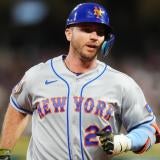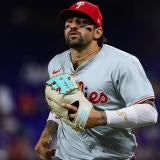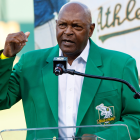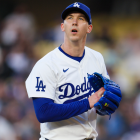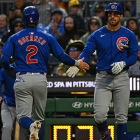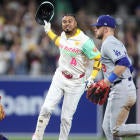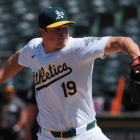
Vida Blue, a 17-year major leaguer and an important member of the dynastic Oakland Athletics during their World Series three-peat from 1972-74, has died, the team announced Sunday. He was 73. A cause of death was not given.
"There are few players with a more decorated career than Vida Blue," the A's said in a statement. "He was a three-time champion, an MVP, a six-time All-Star, a Cy Young Award winner, and an Oakland A's Hall of Famer. Vida will always be a franchise legend and a friend. We send our deepest condolences to his family and friends during this arduous time."
Rest in peace, Vida 💚💛 pic.twitter.com/MXHRuRFfjH
— Oakland A's (@Athletics) May 7, 2023
Born and raised in Louisiana, Blue was drafted by the then-Kansas City Athletics in the second round of the 1967 draft. The left-hander made his MLB debut as a 19-year-old in 1969 and, the next year, he threw a nine-strikeout no-hitter against the Minnesota Twins on Sept. 21. Ten days earlier Blue had thrown a one-hitter against the Kansas City Royals.
In 1971, Blue had one of the great pitching seasons in baseball history, going 24-8 with a 1.82 ERA and 0.95 WHIP in 312 innings. He made 39 starts and threw 24 complete games that year, and earned AL Cy Young and MVP honors. At age 22, Blue became the youngest player to win the AL MVP award in the 20th century.
A contract dispute with A's owner Charlie Finley limited Blue to 25 games in 1972 and he worked primarily out of the bullpen that postseason. Blue took the loss in Game 6 of the World Series against the Big Red Machine Cincinnati Reds, though Oakland went on to win the series in seven games. All told, Blue had a 2.57 ERA in 14 innings that October.
From 1971-76, Blue was simply one of the best pitchers in the game with the A's, pitching to a 2.72 ERA and averaging a touch over 264 innings per season. He was at his finest in the postseason, notably recording a four-inning save in the decisive Game 5 of the 1972 ALCS against the Detroit Tigers and throwing a two-hit shutout against the Baltimore Orioles in Game 3 of the 1974 ALCS.
Vida Blue rest in peace, my mentor, hero, and friend. I remember watching a 19 year old phenom dominate baseball, and at the same time alter my life. There are no words for what you have meant to me and so many others. My heart goes out to the Blue family🙏🏿🙏🏿
— Dave “Smoke” Stewart (@Dsmoke34) May 7, 2023
Blue had a sour relationship with Finley. In 1976, he told reporters, "I hope the next breath Charlie Finley takes is his last. I hope he falls flat on his face and dies of polio." Soon thereafter Finley attempted to sell Blue's contract to the New York Yankees and trade him to the Reds, though commissioner Bowie Kuhn vetoed both moves.
It wasn't until March 1978 that Finley successfully traded Blue, sending him to the San Francisco Giants in a seven-player swap. Blue spent 1978-81 with the Giants and 1982-83 with the Royals before battling drug addition. He missed the final two months of 1983 and all of 1984 before making a comeback with the Giants in 1985 and 1986.
After the 1983 season, Blue and several former teammates pled guilty to attempting to purchase cocaine, and he also testified in the Pittsburgh drug trials. Blue spent four years on the Hall of Fame ballot (1992-95) and topped out at 8.7% of the vote, well short of the 75% needed for induction. He said he believed his drug problems contributed to him being kept out of the Hall of Fame.
"I had some issues in my life that might have had a tendency to sway voting," Blue said after falling off the Hall of Fame ballot in 1995. "There are some guys in the Hall of Fame who don't have halos."
All told, Blue finished with a 209-161 record and a 3.27 ERA in over 3,300 innings from 1969-86. He was a three-time 20-game winner and a five-time All-Star, he finished in the top seven of the Cy Young voting five times, and he received MVP votes in four seasons. Blue won three World Series championships with the A's from 1972-74.
Blue became the first pitcher in history to start the All-Star Game for both leagues (1971 with A's and 1978 with Giants), and, in a neat bit of trivia, he is the last switch-hitter to win the AL MVP award. Pete Rose famously said Blue threw as hard as any pitcher he'd ever faced, and Blue has long been regarded as one of the hardest throwing lefties in history.
Following his playing career Blue settled in San Francisco and worked with several charitable organizations promoting baseball in inner cities. He also did some television work.








